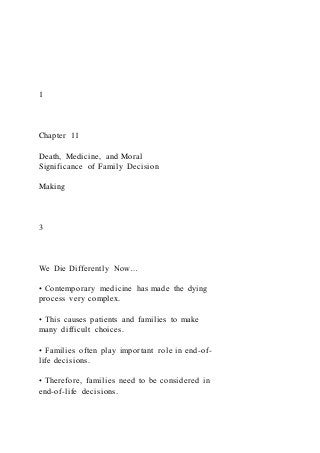1 Chapter 11 Death, Medicine, and Moral Signif
1 Chapter 11 Death, Medicine, and Moral Significance of Family Decision Making 3 We Die Differently Now… • Contemporary medicine has made the dying process very complex. • This causes patients and families to make many difficult choices. • Families often play important role in end-of- life decisions. • Therefore, families need to be considered in end-of-life decisions. 4 Romanizing Death and Demonizing Families • The consensus is that end-of-life decisions should respect patient autonomy and the right to balance benefit with burden. • This consensus sometimes conflicts with the autonomy of the professional. • The main issue is the ability of the patient to make this decision. 5 Romanizing Death and Demonizing Families • There is a need for others to convey the patient’s preferences when he/she cannot do so. • The family is assumed to be in the best position for this decision. • However, they may not be disinterested parties. 6 Romanizing Death and Demonizing Families • We need to guard our judgments concerning starting or stopping life-sustaining therapy when the patient is not able to authorize this action. • There may not be a match between what the patient wants and how the family member’s understanding matches this want. 7 Romanizing Death and Demonizing Families • Society has generated laws to empower patients to make their own decisions about death and dying. • These laws attempt to protect their ability to die in agreement with their beliefs and who they are as people. 8 Dying in Intimacy • Previous claims about the role of families in the dying process have been overstated. • Few people have taken advantage of advanced directives. • The medical practice may be confused about the patient’s definition of a good death. 9 Dying in Intimacy • Many people think of their families as advanced directives. • However, many people are not able to express their preferences for action in a future crisis. • Advanced directives do not consider the nuances of a romantic death. 10 Dying in Intimacy • The ill are not excused from their obligation to family because of their illness. • Selfishness is not the only approach to illness. • Policies should be made to recognize the role of the family in making proxy decisions. 11 Dying in Intimacy • Hospitals have their own agenda when it comes to the dying patient. • Patients need to be empowered in a setting which has the power to control their autonomy. • Patients must be able to have contact with their sources of protection and personal affirmation. 12 Solution s • When people trust their families, they should be allowed to have them make proxy decisions. • When they do not, non-family proxies could be appointed. • Specific treatment directives could also be available. 13 ...

Recommended
Recommended
More Related Content
More from LeilaniPoolsy
More from LeilaniPoolsy (20)
1 Chapter 11 Death, Medicine, and Moral Signif
- 1. 1 Chapter 11 Death, Medicine, and Moral Significance of Family Decision Making 3 We Die Differently Now… • Contemporary medicine has made the dying process very complex. • This causes patients and families to make many difficult choices. • Families often play important role in end-of- life decisions. • Therefore, families need to be considered in end-of-life decisions.
- 2. 4 Romanizing Death and Demonizing Families • The consensus is that end-of-life decisions should respect patient autonomy and the right to balance benefit with burden. • This consensus sometimes conflicts with the autonomy of the professional. • The main issue is the ability of the patient to make this decision. 5 Romanizing Death and Demonizing Families • There is a need for others to convey the patient’s preferences when he/she cannot do so. • The family is assumed to be in the best position for this decision. • However, they may not be disinterested parties. 6
- 3. Romanizing Death and Demonizing Families • We need to guard our judgments concerning starting or stopping life-sustaining therapy when the patient is not able to authorize this action. • There may not be a match between what the patient wants and how the family member’s understanding matches this want. 7 Romanizing Death and Demonizing Families • Society has generated laws to empower patients to make their own decisions about death and dying. • These laws attempt to protect their ability to die in agreement with their beliefs and who they are as people. 8 Dying in Intimacy
- 4. • Previous claims about the role of families in the dying process have been overstated. • Few people have taken advantage of advanced directives. • The medical practice may be confused about the patient’s definition of a good death. 9 Dying in Intimacy • Many people think of their families as advanced directives. • However, many people are not able to express their preferences for action in a future crisis. • Advanced directives do not consider the nuances of a romantic death. 10 Dying in Intimacy • The ill are not excused from their obligation to family because of their illness. • Selfishness is not the only approach to illness. • Policies should be made to recognize the role
- 5. of the family in making proxy decisions. 11 Dying in Intimacy • Hospitals have their own agenda when it comes to the dying patient. • Patients need to be empowered in a setting which has the power to control their autonomy. • Patients must be able to have contact with their sources of protection and personal affirmation. 12 Solution s • When people trust their families, they should be allowed to have them make proxy decisions.
- 6. • When they do not, non-family proxies could be appointed. • Specific treatment directives could also be available. 13